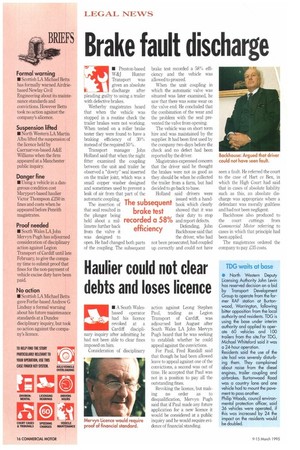Brake fault discharge
Page 18

If you've noticed an error in this article please click here to report it so we can fix it.
• Preston-based W&J Hunter Transport was given an absolute discharge after pleading guilty to using a trailer with defective brakes.
Wetherby magistrates heard that when the vehicle was stopped in a routine check the trailer brakes were not working. When tested on a roller brake tester they were found to have a braking efficiency of 30% instead of the required 50%.
Transport manager John Holland said that when the night fitter examined the coupling between the unit and trailer he observed a "dowry" seal inserted on the trailer joint, which was a small copper washer designed and sometimes used to prevent a leak of air from that part of the automatic coupling.
The insertion of that seal resulted in the plunger being held about a millimetre further back from the valve it was designed to open. He had changed both parts of the coupling. The subsequent brake test recorded a 58% effi ciency and the vehicle was allowed to proceed.
When the unit coupling in which the automatic valve was situated was later examined, he saw that there was some wear on the valve end. He concluded that the combination of the wear and the problem with the seal prevented the valve from opening.
The vehicle was on short term hire and was maintained by the supplier. It had been first used by the company two days before the check and no defect had been reported by the driver.
Magistrates expressed concern that the driver said he thought the brakes were not as good as they should be when he collected the trailer from a farm, but had decided to go back to base.
Holland said drivers were issued with a handbook which clearly showed that it was their duty to stop and report defects Defending, John Backhouse said that the driver, who had not been prosecuted, had coupled up correctly and could not have seen a fault. He referred the court to the case of Hart vs Rex, in which the High Court had said that in cases of absolute liability such as this, an absolute discharge was appropriate where a defendant was morally guiltless and had not been negligent
Backhouse also produced to the court cuttings from Commercial Motor referring to cases in which that principle had been applied.
The magistrates ordered the company to pay £35 costs.
































































































